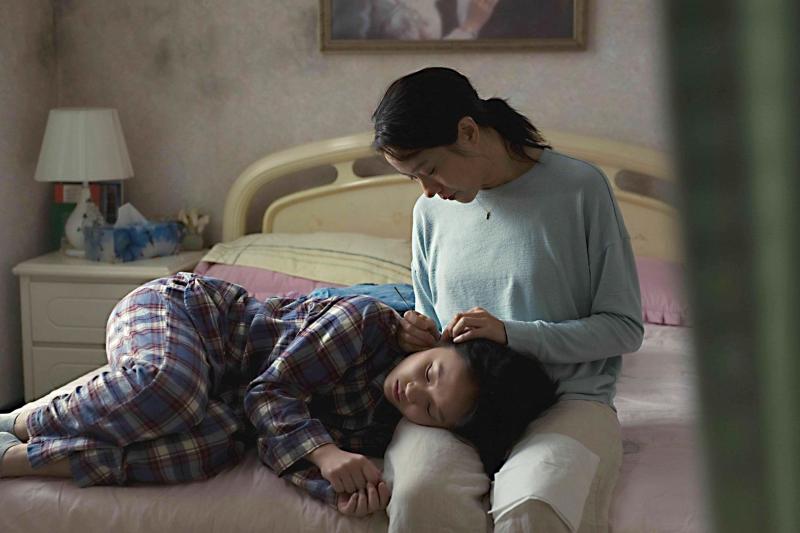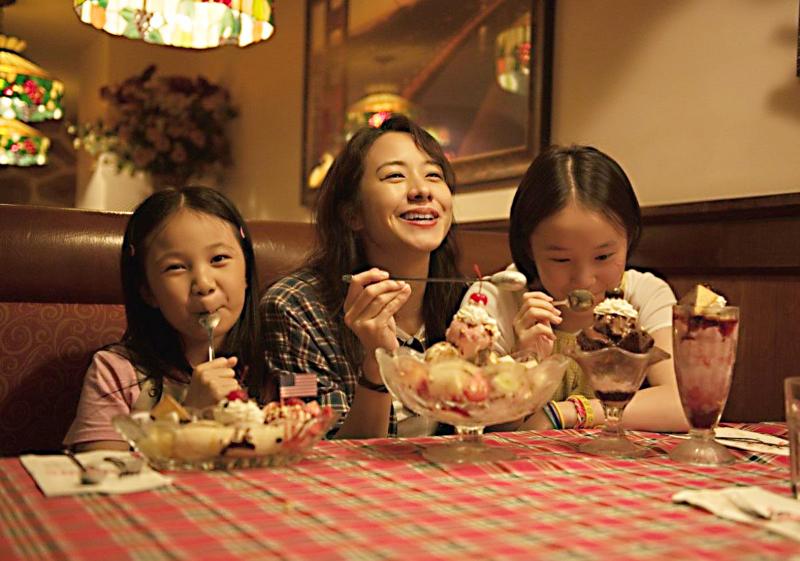American Girl (美國女孩) is a slice-of-life drama that captures a short but turbulent period in the life of 13-year-old Fen (Caitlin Fang, 方郁婷), who is suddenly transplanted from Los Angeles to Taipei, where her father works, due to her mother’s cancer treatment.
The much hyped film was made available last week on Netflix after a strong Golden Horse showing last year: Fiona Roan Feng-i (阮鳳儀) won best new director, Fang claimed best new actor while the film won best cinematography and the Audience Choice Award.
The challenges of adapting to a new culture and its school system will resonate strongly with diaspora kids caught between both worlds. The details — from being hit by a teacher over bad test scores, to being called “American” by classmates and wolfing down banana floats at Swensen’s for a taste of home — are trips down memory lane.

Photo courtesy of iFilm
Meanwhile, the 2003 SARS epidemic looms, and the film puts great care into reconstructing the social and cultural atmosphere of Taiwan during that era. The story mirrors Roan’s real-life experiences, drawing from a period in her upbringing and her family’s relationship.
Even though they can speak Mandarin, Fen and her sister Ann encounter difficulties adapting to their new environs while dealing with their frazzled parents. It’s reverse culture shock for Fen, who already had to go through this process when they first moved to the US. She adapted well, becoming a straight-A student with a best friend who shares her passion for horse riding, and desperately wants to return to America. Whether simply going back will fix all her problems is something she has to grapple with.
Their mother Lily (Carena Lam, 林嘉欣) isn’t coping well with her illness, and it’s taking a toll on the family. She frequently brings up her possible death and seeks something to blame it on, while father Huay (Kaiser Chuang, 莊凱勛) is under pressure to provide a better living for his family. He cares for the children and tries to connect with them, but he barely knows them.

Photo courtesy of iFilm
Even though Fen is the main focus, she’s not the only one who is dealing with distress; the entire family is in turmoil as the adults are not well enough to keep their lives entirely together.
Lily and Huay have much to figure out as they’ve been living in separate countries, only reunited under unfortunate circumstances. They aren’t just relegated to the background as the protagonist finds her way; they’re given depth as flawed, complex characters, providing some genuinely happy moments for their kids during this unhappy time.
Huay and surprisingly mature Ann play vital roles too as they cope in their own ways, but Fen and Lily’s temperamental conflict is what makes the film.
Most of Fen’s frustrations are directed toward her mother, and she lashes out whenever Lily speaks about dying. While Fang won the acting award, Lam does a solid job portraying Lily, who isn’t the most sympathetic character. She resents her illness and her circumstances, especially Fen’s constant complaining about Taiwan and acting out. The two do share some poignant conversations that speak to gender roles in Asia, such as Lily wanting to be reborn as a man in the next life.
These nuances add much to the film, keeping it from becoming another feel-good, melodramatic, coming-of-age movie with a big message and teary reconciliation.
In fact, there aren’t really any major transformations or revelations in the movie. Life just goes on.
Instead of harping on the obvious, Roan seeks more to explore the intricate mother-daughter relationship — especially in Asian society — and make sense of the messy yet often-unspoken emotions and ties that ultimately bind a family together.

Dissident artist Ai Weiwei’s (艾未未) famous return to the People’s Republic of China (PRC) has been overshadowed by the astonishing news of the latest arrests of senior military figures for “corruption,” but it is an interesting piece of news in its own right, though more for what Ai does not understand than for what he does. Ai simply lacks the reflective understanding that the loneliness and isolation he imagines are “European” are simply the joys of life as an expat. That goes both ways: “I love Taiwan!” say many still wet-behind-the-ears expats here, not realizing what they love is being an

William Liu (劉家君) moved to Kaohsiung from Nantou to live with his boyfriend Reg Hong (洪嘉佑). “In Nantou, people do not support gay rights at all and never even talk about it. Living here made me optimistic and made me realize how much I can express myself,” Liu tells the Taipei Times. Hong and his friend Cony Hsieh (謝昀希) are both active in several LGBT groups and organizations in Kaohsiung. They were among the people behind the city’s 16th Pride event in November last year, which gathered over 35,000 people. Along with others, they clearly see Kaohsiung as the nexus of LGBT rights.

In the American west, “it is said, water flows upwards towards money,” wrote Marc Reisner in one of the most compelling books on public policy ever written, Cadillac Desert. As Americans failed to overcome the West’s water scarcity with hard work and private capital, the Federal government came to the rescue. As Reisner describes: “the American West quietly became the first and most durable example of the modern welfare state.” In Taiwan, the money toward which water flows upwards is the high tech industry, particularly the chip powerhouse Taiwan Semiconductor Manufacturing Co (TSMC, 台積電). Typically articles on TSMC’s water demand

Every now and then, even hardcore hikers like to sleep in, leave the heavy gear at home and just enjoy a relaxed half-day stroll in the mountains: no cold, no steep uphills, no pressure to walk a certain distance in a day. In the winter, the mild climate and lower elevations of the forests in Taiwan’s far south offer a number of easy escapes like this. A prime example is the river above Mudan Reservoir (牡丹水庫): with shallow water, gentle current, abundant wildlife and a complete lack of tourists, this walk is accessible to nearly everyone but still feels quite remote.